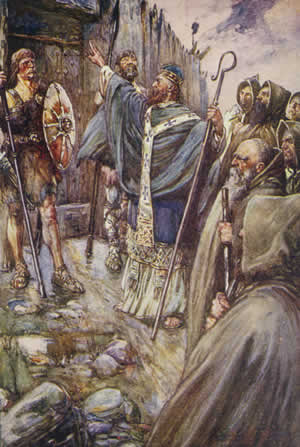
Columba or Colmcille was an Irish abbot and missionary evangelist credited with spreading Christianity in what is today Scotland at the start of the Hiberno-Scottish mission. He founded the important abbey on Iona, which became a dominant religious and political institution in the region for centuries. He is the patron saint of Derry. He was highly regarded by both the Gaels of Dál Riata and the Picts, and is remembered today as a Catholic saint and one of the Twelve Apostles of Ireland.

Halloween or Hallowe'en is a celebration observed in many countries on 31 October, the eve of the Western Christian feast of All Hallows' Day. It is at the beginning of the observance of Allhallowtide, the time in the liturgical year dedicated to remembering the dead, including saints (hallows), martyrs, and all the faithful departed. In popular culture, the day has become a celebration of horror, being associated with the macabre and supernatural.

Presbyterianism is a part of the Reformed (Calvinist) tradition within Protestantism that broke from the Roman Catholic Church. Presbyterian churches derive their name from the presbyterian form of church government by representative assemblies of elders. Many Reformed churches are organised this way, but the word Presbyterian, when capitalized, is often applied to churches that trace their roots to the Church of Scotland or to English Dissenter groups that formed during the English Civil War.
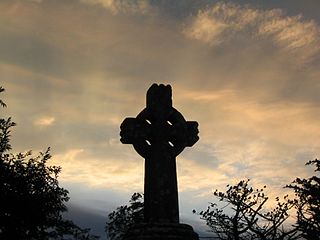
Celtic Christianity is a form of Christianity that was common, or held to be common, across the Celtic-speaking world during the Early Middle Ages. Some writers have described a distinct Celtic Church uniting the Celtic peoples and distinguishing them from adherents of the Roman Church, while others classify Celtic Christianity as a set of distinctive practices occurring in those areas. Varying scholars reject the former notion, but note that there were certain traditions and practices present in both the Irish and British churches that were not seen in the wider Christian world.

Waterford is a city in County Waterford in the south-east of Ireland. It is located within the province of Munster. The city is situated at the head of Waterford Harbour. It is the oldest and the fifth most populous city in the Republic of Ireland. It is the ninth most populous settlement on the island of Ireland. According to the 2022 census, 60,079 people live in the city, with a wider metropolitan population of 82,963.
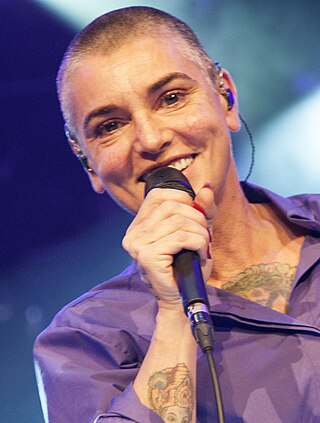
Sinéad Marie Bernadette O'Connorshin-AYD was an Irish singer, songwriter, and activist. Her debut studio album, The Lion and the Cobra, was released in 1987 and achieved international chart success. Her 1990 album, I Do Not Want What I Haven't Got, was her biggest commercial success, selling over seven million copies worldwide. Its lead single, "Nothing Compares 2 U", was honoured as the top world single of the year at the Billboard Music Awards.

Ireland is an island in the North Atlantic Ocean, in north-western Europe. It is separated from Great Britain to its east by the North Channel, the Irish Sea, and St George's Channel. Ireland is the second-largest island of the British Isles, the third-largest in Europe, and the twentieth-largest in the world.

Anglo-Irish people denotes an ethnic, social and religious grouping who are mostly the descendants and successors of the English Protestant Ascendancy in Ireland. They mostly belong to the Anglican Church of Ireland, which was the established church of Ireland until 1871, or to a lesser extent one of the English dissenting churches, such as the Methodist church, though some were Roman Catholics. They often defined themselves as simply "British", and less frequently "Anglo-Irish", "Irish" or "English". Many became eminent as administrators in the British Empire and as senior army and naval officers since the Kingdom of England and Great Britain were in a real union with the Kingdom of Ireland for over a century, before politically uniting into the United Kingdom of Great Britain and Ireland in 1801.

The Church of Ireland is a Christian church in Ireland, and an autonomous province of the Anglican Communion. It is organised on an all-Ireland basis and is the second-largest Christian church on the island after the Roman Catholic Church. Like other Anglican churches, it has retained elements of pre-Reformation practice, notably its episcopal polity, while rejecting the primacy of the pope.
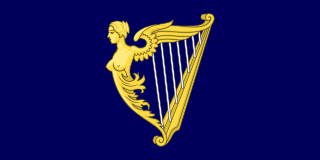
The Kingdom of Ireland was a monarchy on the island of Ireland that was a client state of England and then of Great Britain. It existed from 1542 until 1801. It was ruled by the monarchs of England and then of Great Britain, and was administered from Dublin Castle by a viceroy appointed by the English king: the Lord Deputy of Ireland. Aside from brief periods, the state was dominated by the Protestant English minority. The Protestant Church of Ireland was the state church. The Parliament of Ireland was composed of Anglo-Irish nobles. From 1661, the administration controlled an Irish army. Although styled a kingdom, for most of its history it was, de facto, an English dependency. This status was enshrined in Poynings' Law and in the Declaratory Act of 1719.
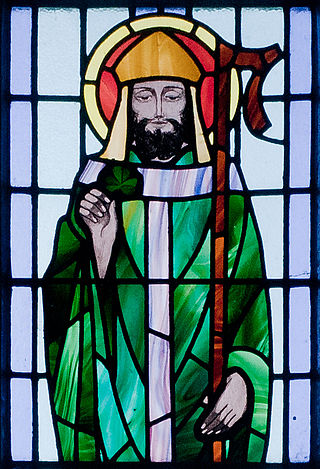
Saint Patrick's Day, or the Feast of Saint Patrick, is a religious and cultural holiday held on 17 March, the traditional death date of Saint Patrick, the foremost patron saint of Ireland.

Saint Brigid of Kildare or Saint Brigid of Ireland is the patroness saint of Ireland, and one of its three national saints along with Patrick and Columba. According to medieval Irish hagiographies, she was an abbess who founded the important abbey of Kildare, as well as several other convents of nuns. There are few historical facts about her, and her hagiographies are mainly anecdotes and miracle tales, some of which are rooted in pagan folklore. They say Brigid was the daughter of a chieftain and a slave woman, and was raised in a druid's household before becoming a consecrated virgin. She is patroness of many things, including poetry, learning, healing, protection, blacksmithing, livestock and dairy production. In her honour, a perpetual fire was kept burning at Kildare for centuries.

British society is one of the most secularised in the world and in many surveys determining religious beliefs of the population agnosticism, nontheism, atheism, secular humanism, and non-affiliation are views shared by a majority of Britons. Historically, it was dominated for over 1,400 years by various forms of Christianity, which replaced preceding Romano-British religions, including Celtic and Anglo-Saxon paganism. Religious affiliations of United Kingdom citizens are recorded by regular surveys, the four major ones being the national decennial census, the Labour Force Survey, the British Social Attitudes survey and the European Social Survey.
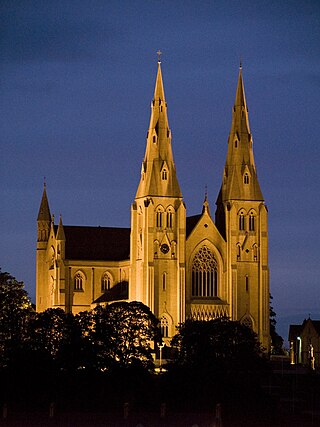
The Catholic Church in Ireland or Irish Catholic Church, is part of the worldwide Catholic Church in communion with the Holy See. With 3.7 million members, it is the largest Christian church in Ireland. In the Republic of Ireland's 2016 census, 78% of the population identified as Catholic; this was 6% lower than the 2011 figure. By contrast, 41% of people in Northern Ireland identified as Catholic at the 2011 census; it is expected that this proportion will increase in the coming years. The Archbishop of Armagh, as the Primate of All Ireland, has ceremonial precedence in the church. The church is administered on an all-Ireland basis. The Irish Catholic Bishops' Conference is a consultative body for ordinaries in Ireland.

Saint Patrick was a fifth-century Romano-British Christian missionary and bishop in Ireland. Known as the "Apostle of Ireland", he is the primary patron saint of Ireland, the other patron saints being Brigid of Kildare and Columba. Patrick was never formally canonised, having lived before the current laws of the Catholic Church in these matters. Nevertheless, he is venerated as a saint in the Catholic Church, the Lutheran Church, the Church of Ireland, and in the Eastern Orthodox Church, where he is regarded as equal-to-the-apostles and Enlightener of Ireland.

The Diocese of Connor is in the Province of Armagh of the Church of Ireland.

The Archbishop of Armagh is an archiepiscopal title which takes its name from the city of Armagh in Northern Ireland. Since the Reformation, there have been parallel apostolic successions to the title: one in the Roman Catholic Church and the other in the Church of Ireland. The archbishop of each denomination also holds the title of Primate of All Ireland.
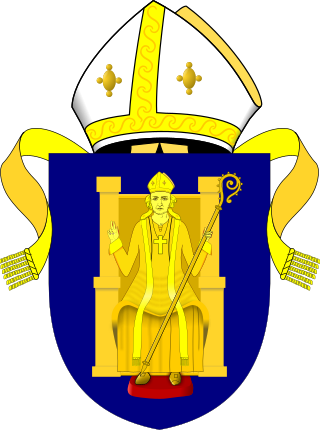
The Diocese of Clogher is a diocese of the Church of Ireland in the north of Ireland. It is in the ecclesiastical province of Armagh. It covers a rural area on the border between Northern Ireland and the Republic of Ireland including much of south west Ulster, taking in most of the counties Fermanagh and Monaghan and parts of counties Cavan, Leitrim and Donegal.

The Presbyterian Church in Ireland is the largest Presbyterian denomination in the Republic of Ireland, and the largest Protestant denomination in Northern Ireland. Like most Christian churches in Ireland, it is organised on an all-island basis, in both Northern Ireland and the Republic of Ireland. The church has approximately 210,000 members.

Andrew John Hozier-Byrne, known professionally as Hozier, is an Irish musician, singer and songwriter. His music primarily draws from folk, soul and blues, often using religious and literary themes and a political or social justice stance.



















